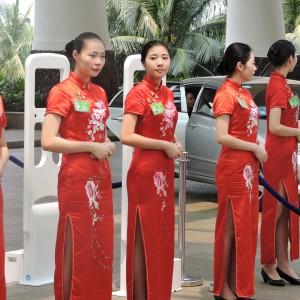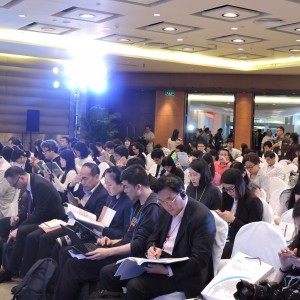aNewDomain — Here at the Boao Forum for Asia, world leaders, multinational corporate CEOs and economists gathered together today to discuss innovation, business, economic reform … and love.
— Here at the Boao Forum for Asia, world leaders, multinational corporate CEOs and economists gathered together today to discuss innovation, business, economic reform … and love.
Yes, love.
At the panel I moderated here this morning on the dynamic rise of the sharing economy in Asia and elsewhere, Zhang Bingjun, co-founder and CEO of car sharing behemoth PPZhuche told me that was the essence of the sharing economy.
“Love is at its core,” he told the audience of some 2,000 delegates in the audience. The sharing economy, he said, appeals to the innately human instinct to share resources with his neighbors in order to ensure harmony, preserve resources and help others.
 Zhang was one of six panelists I hosted. The others, AirBNB VP Varsha Rao, Didi Dache COO Li Jianhou, Tujia founder Justin Luo, Home-Cooking chair Smile Tang and Yidao CEO Herman Zhou, nodded firmly in agreement.
Zhang was one of six panelists I hosted. The others, AirBNB VP Varsha Rao, Didi Dache COO Li Jianhou, Tujia founder Justin Luo, Home-Cooking chair Smile Tang and Yidao CEO Herman Zhou, nodded firmly in agreement.
Explained Tang: “I come from the rural areas of China, where people naturally don’t hesitate to share a cow or other necessary resources with neighbors in time of need.” The emergence of the sharing economy, which analysts believe will top some $300 billion in the next four years, is the natural extension of that instinct.
Another hot topic of discussion on the panel had to do with regulation. Government agencies in the U.S., China and other countries increasingly are turning their attention to sharing economy companies. This is in response to growing areas of concern around worker rights and the tax impact of this fundamentally new way of doing business.
Over coffee in our pre-panel meeting, Didi Dache’s Li had told me that, contrary to my expectations, his firm was prepared to work with the government’s inevitable intervention with his service. Didi, the No. 1 transportation-sharing firm here in China, “welcomed regulation,” he told me.
 This surprised me, but not as much as another comment from Yidao CEO Herman Zhou, in which he eschewed regulation altogether.
This surprised me, but not as much as another comment from Yidao CEO Herman Zhou, in which he eschewed regulation altogether.
“We should regulate ourselves and the government should not get involved,” he said. That’s in the interest of the growth of this sector, which China Premier Li Keqiang said two days ago is critical to China’s new economy.
It’s new, alright. This isn’t your daddy’s China.
There’s no question that AirBNB, Uber, Didi Dache, PPZhuche, Yidao and Tujia services, among others, have already fundamentally altered the way the hotel and transformation businesses operate, amounting to nearly half of all those services.
So you’ve just got to wonder what’s really driving this behind the scenes.
 The “sharing economy” is a term that first entered the English vernacular back in 2002, when Harvard law Prof Yochai Benkler of Harvard Law School used it to refer to the then nascent open-software movement. But it really got its start during the 2008 financial crisis.
The “sharing economy” is a term that first entered the English vernacular back in 2002, when Harvard law Prof Yochai Benkler of Harvard Law School used it to refer to the then nascent open-software movement. But it really got its start during the 2008 financial crisis.
That makes sense, Zhou pointed out, as it is a dearth of resources that lies at the heart of the meteoric rise of sharing companies in China and elsewhere.
Take the ride and car-sharing markets. Didi’s Li told me that there are some 100M cars in China, compared with 300M licensed drivers. And by 2020, analysts predict there will be 1B of them. When resources are limited, sharing is a natural way to exchange goods and service, added PPZhuche CEO Zhang.
 The twin drivers of the sharing business in China, as in the U.S. and elsewhere, are will and trust, all panelists agree. For it to take off and continue to grow, sellers must have the will to sell goods — and buyers must have trust.
The twin drivers of the sharing business in China, as in the U.S. and elsewhere, are will and trust, all panelists agree. For it to take off and continue to grow, sellers must have the will to sell goods — and buyers must have trust.
The importance of trust cannot be over emphasized, AirBNB’s Rao told the audience. In the sharing economy, trust is everything. The main concern Rao and the other panelists have about the continued growth of the sector isn’t regulation so much as it is maintaining the quality and continually ensuring that services continue to earn the trust of those on both sides of the transaction.
To me, the most fascinating thing about the current and future state of the sharing economy is that it relies so much upon the so-called tragedy of the commons. This is the idea that, to the extent each of us follows his or her self-interest, the shared resources we all must rely on are depleted.
China, for sure, seems uniquely set up to take advantage of this intriguing change in the way people think about buying and selling rides, hotel rooms, home-cooked meals and many, many other services. In the U.S., fewer than 42 percent of those surveyed say they have the trust needed to truly rely on services like the ones Uber and AirBNB pioneered in the U.S. eight years ago.
In China, that number is closer to 90 percent.
And if that’s not love, what is?
For aNewDomain, reporting from BFA 2016 here in Bo’ao, China, I’m Gina Smith.
All images: Gina Smith for aNewDomain, All Rights Reserved.













